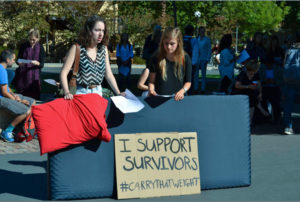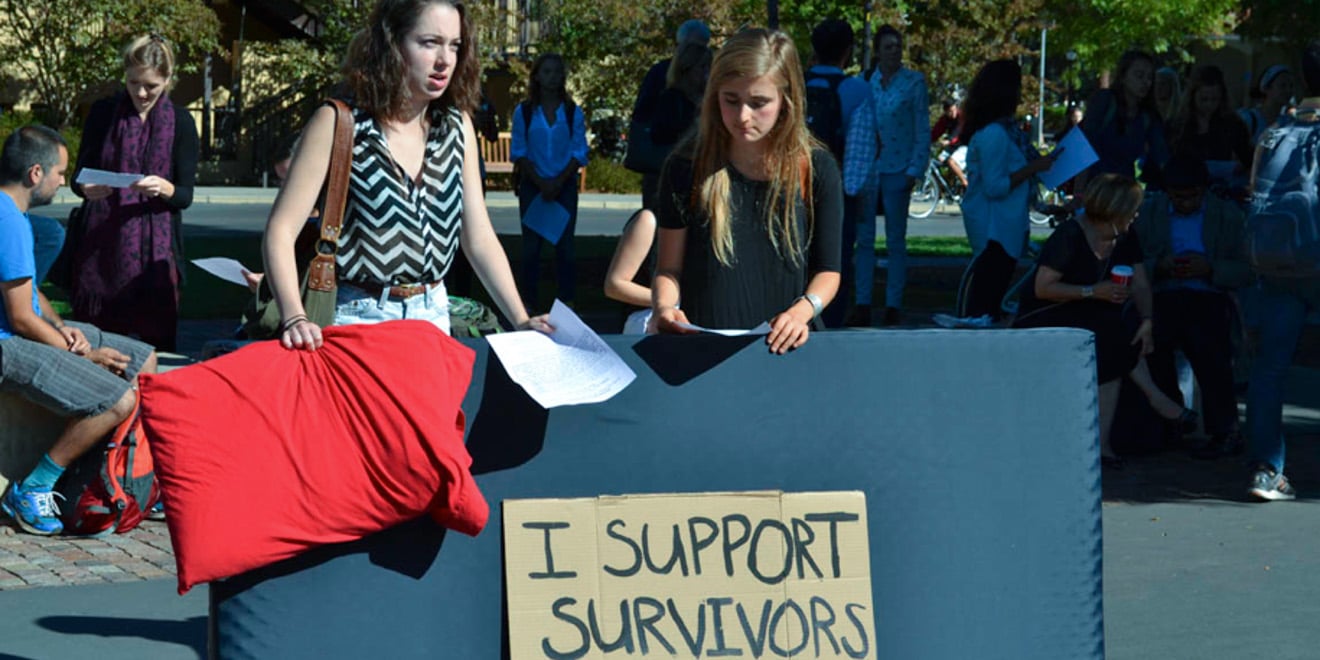A new peer support group for survivors of sexual assault has formed to fill a gap at Stanford, raising new questions about a campus conversation that may focus more on sexual assault prevention than support for survivors.

Following a series of high-profile rape cases, Stanford students have been inundated with activism surrounding campus sexual assault. Conversations among students have largely focused on changing University policies and community attitudes, with groups like the Association of Students for Sexual Assault Prevention (ASAP) and the Fearless Conference at the forefront of the activist scene. Both groups are led by teams that include survivors and make it part of their mission to advocate on behalf of those who have experienced sexual assault.
But amidst all of the activism aimed at University administrators, some survivors have felt isolated. In response, last year two students piloted a Peer Support Group (PSG) for survivors of sexual assault with the support of the Office of Sexual Assault and Relationship Abuse (SARA) and the Confidential Support Team (CST).
Co-founders Zhi Ping Teo ’18 and Tina Ju ’18 came up with the idea after they noticed Stanford didn’t have a support group for survivors of sexual assault. Their goal was to provide an open community for survivors of all genders, backgrounds and identities.
In addition to providing a safe space, PSG has also birthed new friendships. Topics of conversation at meetings include experiences with trauma as well as general life at Stanford.
Teo explained that the biggest challenge has come from her role as a facilitator of the group, since conversation can be heavy and there are many awkward pauses.
“It’s about learning to be comfortable with silence sometimes, because people just need company and presence in their lives,” she said.
Perceived lack of support for survivors
After learning a friend had experienced sexual abuse, Teo explored the kinds of communities that already existed for survivors. She inquired with the Women’s Community Center, where she was working as an intern, as well as the ASSU. She said she was “taken aback” to realize there was no peer support group.
Teo said that she had heard of students discussing the possibility of starting a support group in the past, but no one had put in the proper effort to make it happen. In coordination with SARA and CST, she and Ju held their first meeting last winter.
“I just felt very strongly that this kind of community should exist at Stanford, so I wanted to be a part of making it happen,” Teo said. “There were survivors who spoke with me and told me they would be very interested to come, but they just didn’t have the mental energy and physical energy to pull together the administrative logistics, so I felt like I could step in in that space.”
The co-founders invited Hope Yi ’18 to be a facilitator of the group. Yi said that they had told Ju they were a survivor of sexual assault and thought, “Why can’t we talk about the feelings we’re having with others who have experienced the same thing?”
Yi said that, especially in light of Brock Turner, they felt everyone around campus had an opinion on the issue of sexual assault, which was frustrating. They expressed their respect for student endeavors to raise awareness around campus but believe those efforts are “rarely accessible to the survivors they purport to support.” Meanwhile, PSG provides another option for survivors.
“[PSG] creates a space where people can feel empowered by having experiences that would otherwise be perceived to be weak,” Yi said.
Recent University efforts
Second-year Ph.D. student Aku Ammah-Tagoe M.A. ’15, who served on the Provost’s Task Force on Sexual Assault and the subsequent advisory committee, explained that the University’s policy overhaul includes support for survivors.
Making sure survivors would not be “re-traumatized” by the adjudication process was a major goal of the Task Force, leading to new measures such as streamlined testifying procedures and 24-hour counseling, among other services.
Ammah-Tagoe urged students to “be more sensitive” to survivor experiences by respecting the full range and complexity of individual survivors’ needs — whether that means supporting individuals who decide not to engage in activism or standing with those who do.
“When we put pressure on [survivors] to speak up and be recognized, we are often re-traumatizing them,” she said. “All of us have room to grow in terms of how we respect the wishes of survivors.”
She added that the committee sees undergraduate residences and the graduate student community at large as spaces that are less accessible to administrative efforts, but where students have the potential to make a difference for survivors.
“The graduate community is more professional and less residential, so within the graduate schools there isn’t a lot of conversation about sexual assault, sexual harassment,” said Ammah-Tagoe. “I think the graduate community has a lot less visibility and that’s something the University thinks about but can’t solve on its own, so there’s room for students to do work.”
Activism — triggering or necessary?
For some, highlighting survivors’ needs also means recognizing the potential tension between speaking up on sexual assault and staying sensitive toward those who have experienced trauma.
While Yi acknowledges that activist groups do important work to raise awareness of sexual assault on campus, they are concerned that survivors may not feel included. The Fearless Conference, they explained, is largely targeted toward and run by students in Greek life. To advertise the Conference as a safe space for survivors, they said, is “presumptuous considering [the Greek community] is not a safe space.” Even the word “fearless” can be hurtful.
“Folks like me are going to live with fear for the rest of our lives,” Yi said.
Law professor Michele Dauber, who has been an outspoken advocate for changing University Title IX policies to better support survivors, stressed the importance of honoring the variety of choices survivors make in response to their experiences, which include seeking support from peers as well as engaging in public activism.
In response to concerns that activism can often be triggering, Dauber said that it may be unavoidable, because advocacy inherently involves speaking out.
“Talking about sexual assault, covering it in the media and protesting or advocating about it can be triggering, but that is because the underlying facts are upsetting,” she said in an email to The Daily. “The fact that rape is so prevalent in our community is upsetting.”
Matthew Baiza ’18, one of the co-founders of ASAP, said that the group is aware of these kinds of criticisms and is actively working to do better.
“It’s just hard walking the line between sharing information with the public and limiting the negative effects of that,” he said.
He explained that talking about sexual assault in any manner could be triggering for some survivors, yet discussing the issue in the public forum is crucial to raising awareness and advocating for better University policies.
Still, he said that ASAP remains mindful that certain actions could be hurtful, and that the group is committed to understanding and affirming survivors’ experiences.
Teo clarified in an email to The Daily that PSG does not take stances on campus issues, despite individual members’ beliefs. She personally praised Fearless for reaching out to diverse communities.
While individual members may be at different stages of healing and hold diverging views on policy and activism, the founders of PSG believe that the value of the group lies in creating a community for survivors that includes and accepts above all else.
“[We] want to reach out to survivors on this campus who may not have found a space that they are comfortable with to let them know they have fellow survivors here who would like to just be with them,” Teo said. “When they’re ready and want to talk about trauma, healing and moving forward, there’s a space here for them.”
Fangzhou Liu contributed reporting to this article.
Contact Sarah Ortlip-Sommers at sortlip ‘at’ stanford.edu.
